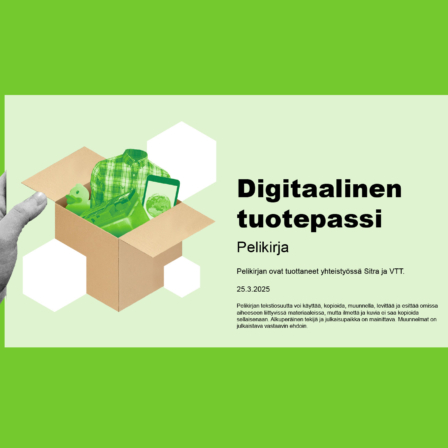The transition to a circular economy The circular economy An economic model which does not focus on producing more and more goods, but in which consumption is based on using services – sharing, renting and recycling – instead of owning. Materials are not destroyed in the end, but are used to make new products over and over again. Open term page The circular economy comes with environmental, economic and social impacts. The transition will affect employment and jobs: some jobs will be lost, new jobs will emerge and most jobs will change in one way or another.
Sitra’s working paper “How does the circular economy change jobs in Europe?” looks into the social impacts of a circular economy in five European countries and four sectors that represent some of the key focus areas of the EU’s Circular Economy Action Plan: construction, textiles, plastics and electronics. The paper is based on interviews with circular economy experts in the Czech Republic, Finland, France, Poland and the Netherlands.
As Kari Herlevi, Project Director for the circular economy at Sitra, points out: “The principles and practices of the circular economy will affect almost every job. The transition will require plenty of new skills.”
“We are not anticipating a huge number of new professions or job descriptions. Instead, almost every profession will change. For example, in construction, professionals are likely to work more on the renovation and refurbishment of existing buildings and on modular construction rather than building new ones. This will require new skills.”
Different skills are needed in different sectors
Sitra’s working paper identified design and the development of durable, repairable and recyclable materials and products as essential skills that will be needed in all the sectors covered by the study. According to the European Commission, approximately 80 per cent of products’ environmental impacts are determined in the design phase.
In the construction sector, the circular design of the built environment will mean some fundamental changes for the entire sector and will create new lines of work. Updated skills are required throughout the construction value chain, including skills in the area of digital solutions.
Increasing the sorting and recycling rates for plastics is expected to create new jobs in the EU. New unique combinations of skills are needed to support the growth of a circular plastics economy.
In the electronics sector, jobs are likely to be created in design, the extension of product lifetimes and material recovery. There is also a growing demand for skills related to the recycling of e-waste.
Can Finland become a forerunner in circular textiles?
According to Sitra’s working paper, a circular transition is likely to create new jobs in the European textile industry in the sorting and recycling of textiles, production, and reuse and repair services. Highly skilled jobs in eco-design, innovation and development of new textile fibres, clothing-as-a-service models and marketplaces for second-hand clothes are expected to emerge.
“We are seeing many interesting developments in the textile sector – in Europe and especially in Finland,” says Kari Herlevi. “Many sustainable and circular fibre technologies are entering commercial scale production. These technologies can have a huge positive impact on climate and biodiversity.”
A large-scale textile end-of-life refinement plant is due to open in 2021 in Paimio, Finland. According to Herlevi, textile recycling can create both jobs and business opportunities in Finland: “The textile industry is a great example of a sector that can tackle its environmental and social challenges with circular economy solutions. In Finland, more investment and co-operation across the value chain are needed to speed up the creation of a circular textile industry. It is looking very promising, but there is no time to waste. Other countries are moving fast too.”
Read Sitra’s working paper “How does the circular economy change jobs in Europe?”.





















Recommended
Have some more.